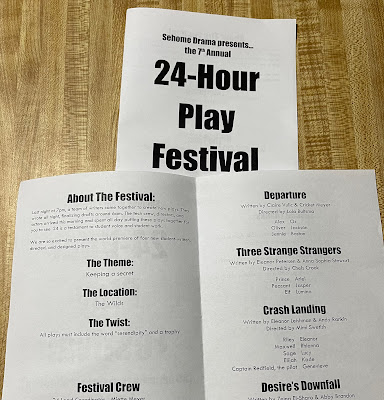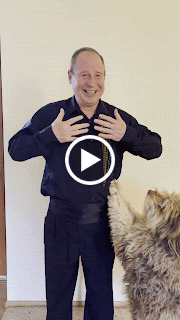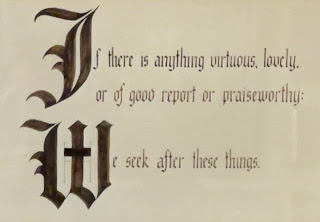Drag queens are fierce. You may not realize this, but Canadian drag queens are particularly fierce. Delightfully polite, yes, but fierce.
So you’d think I would remember how a bunch of fierce Canadian drag queens put me in the hospital last week.
But I’m getting ahead of the story.
I’ve never done drag myself. To the contrary, I haven’t worn a dress since I was in the Grade 4 class play. If I were to put on a pair of heels I'd immediately fall off and break both ankles.
I confess I didn’t used to be much of a drag connoisseur, either. The only times I’ve ever seen episodes of RuPaul’s Drag Race were when I was visiting gay bars in Seattle and Dallas, and Drag Race happened to be on all the screens. Seeing live performances by Dame Edna and Jinx Monsoon terrified me. Not because they’re drag queens – but because they’re all flaming extroverts.
Other introverts will back me up on this. It’s not just drag queens, it’s extroverts in general. Of course I love them to death. I could never inch out of my personal rut without some extrovert’s kind encouragement/nagging. But spending a whole afternoon alone with Yogi, Basil, or Rory would put me in a coma. Even my beloved Drama Queen daughter knows if she doesn't pay attention to my imaginary volume control clicker, I’m going to run away from our conversation and lock myself in my room.
The Drag Queens of Vancouver Men’s Chorus have changed my life. In so many ways.
For the last ten years, VMC’s biggest annual fundraiser event has been a musical revue entitled “Singing Can Be A Drag.” Each spring the queens and their vast retinue put on two shows a night at intimate theatres in Vancouver and New Westminster, wowing sold-out audiences of donors and other liquored fans. The key rule: No Lip Synching! Instead, the most talented individual soloists from VMC put on stunning performances of their favourite songs, live and in full voice, backed up by a band and scantily-clad dancing boys, all in fabulous outfits and stiletto heels.
During my first couple of years with VMC, I was still too shell-shocked by PTSD to face such an over-stimulating environment. Then a couple of years ago I was brave enough to buy a ticket to the Vancouver performance. It was a revelation.
Not just my introduction to the bevy of fabulous and talented drag performers. Ever since my PTSD diagnosis, I’d been completely overwhelmed by crowds in noisy low-ceilinged rooms. For example, after chorus rehearsals on Wednesday nights, I could barely dart into the pub to say hi to one or two friends before fleeing to safety outside.
Sure enough, as I sat in my seat at the Granville Island Revue Stage, the raucous pre-show crowd blew all my fuses. But that was the night I made an important discovery – with the help of a couple of drinks and a drag on someone’s joint, plus some mindful meditation techniques, I was able to induce a deep trance. The throbbing music and the terrifying crowd of gay guys became part of my blissful cosmic awareness.
Since then I’ve regularly benefited from this self-soothing technique. When appropriate – unfortunately I can’t rely on cosmic trances in numerous other overstimulating environments, such as professional conferences, regular chorus rehearsals, or VMC concerts
. That much bliss would interfere with important tasks like sight-reading new music and pretending to be Jewish.
Last year I got up the nerve to volunteer at the Vancouver performances of Singing Can Be A Drag. I hoped to find a suitably introverted task like folding programs or tidying backstage. Instead, I was assigned to sell raffle tickets.
As my family will attest, this was about as preposterous an assignment as filling in for one of the drag queens. In my entire life, as a child, student, adult, parent, and member of Seattle Men’s Chorus, I’d never sold a raffle ticket to anyone other than my mother. Everyone knows I would hide my supply of compulsory candybars/magazines/raffle tickets, and just write a check at the end of any fund drive.
Fortunately, on my maiden drag raffle voyage VMC management paired me with one of the chorus' extroverted Brazilians, who dragged me into the fun. Cold sober, in the cacophonous and harshly lit lobby. If a patron bought enough raffle tickets, Marciello would guarantee victory by performing a lavish voodoo dance/blessing. Meanwhile, I accosted friends and strangers with endless witty patter. Did you know that in a Portuguese accent, “winner” sounds just like “wiener”? Some jokes never get old. Together Marciello and I sold hundreds of dollars worth of raffle tickets.
Until this week, I’d also managed to avoid hospitals for fifty-five years. In particular, as long as I retain any voluntary muscle function, I believed I would never be sick enough to take myself to an emergency room.
But I’m also a good parent. I wouldn’t wait for one of my children to be unconscious before seeking medical attention. Happily, our insurance now includes a "walk-in" clinic that’s open seven days a week. It's brought a sane equilibrium to healthcare in our family. The Bellingham clinic is inconvenient enough to deter casual visits, even by notorious hypochondriacs like my daughter – no one wants to sit for a couple of hours in a waiting room surrounded by sniffling children. It’s ideal for those of us whose medical problems don’t involve gunshots or heart attacks, but still can’t wait till we can get an appointment with our regular physician.
Several weeks ago, I began exhibiting sinus infection symptoms. I experienced the familiar yellow snot and nasal congestion. But this time I also woke up each morning with a drooping right eyelid, and battled headaches during the day.
So I refused to go the clinic. The symptoms seemed to be improving by themselves. More importantly, I’ve all of Woody Allen's early movies. I knew I was due for a brain tumour.
As I’ve written in various blog essays, my mental health has significantly improved over the last few months. Meanwhile, my legal work is progressing, and my other writing is going well. I even had enough social confidence to begin taking classes and join local writer groups.
When I started blogging three years ago, I was working on a related book project – a memoir titled “Running With Chainsaws.” Even though I’ve finished a lot of other writing, including starting on a couple of other books, work on the memoir stalled. I’d been so busy doing the living that I wasn't ready for the writing.
Last week I checked in with one of our local writing coaches. She asked my how my memoir was coming along, and reminded me of story-telling arc they use in The Narrative Project. I’d finally identified the key asterisked “scene” on the uphill slope that encapsulates my youthful traumas. Meanwhile, over the last few months I’ve observed the huge progress in my corresponding recovery, most obviously in my newfound freedom to write about subjects I’d avoided for decades. But I couldn’t point to a particular recent “scene” in my story where those themes all came together.
Then I remembered I’d volunteered for this year’s drag fundraiser in Vancouver. I wondered how the Leap Day scene would unfold.
Last Saturday I drove up to Vancouver for Singing Can Be A Drag. It was my first weekend trip to Canada in 2020, and the first hint of spring. I stopped in Davie Village for a small nibble from my favourite local pot edible – the Jelly Bomb equivalent of one glass of red wine at lunch – then parked near Granville Island. I grabbed some orange juice and a toasted beet sandwich at my regular island coffee shop. Those were the last substances I consumed all day.
As I ate my sandwich, I continued writing on my laptop. In addition to automatically raising my spirits, Vancouver also is my perfect muse. Saturday's journal topic was “things that tend to make me a cheap date.” At last count, the bliss-amplifying list included being in Canada, sunshine, VMC, reading, music, well-tended children, coffee, hot sex, and writing.

Last week in “Artificial Emotional Intelligence,” I described how the intersection of social anxiety and Post-Traumatic Stress Disorder resulted in a strange Asperger-y phenomenon over the last few months: in my memory, the images of most gay guys are saved as something like cartoon Muppets. For example, the piano player at Showtunes Night looks like a non-green Kermit the Frog.
As I subsequently confessed in “Do Gay Androids Dream of Electric Brunch,” the Muppet-memory phenomenon mostly applies to gay guys I already know, such as the men of Vancouver Men’s Chorus and the other regulars at Showtunes Night. They give my subconscious something to work with in order to generate each image. In contrast, most gay strangers and straight people don’t look like cartoon Muppets in my memory. They’re human. But they all tend to look the same.
On Saturday I realized it was going to be a bumpy night when I wandered into one of the gender-neutral washrooms at the performance venue. I ran into two drag queens from the chorus and a couple of straight women wearing too much make up. I couldn't recognize any of them. This immediately fried my circuits. For the rest of the night, I couldn’t tell any faces apart.
All my mental Muppets and gay cartoons disappeared. Instead, everyone at the Granville Island Revue Stage last Saturday, regardless of gender or sexual orientation, looked like a character from a Tomie dePaola children’s book. Cheerful and pastel-coloured. But with blank faces.
Before I could get used to my brain’s bewildering new phenomenon, I was drafted for my volunteer assignment: standing at the crowded lobby entrance, where I took tickets and handed out programs to the gathering throng.
I don’t know why Lenny grabbed me for the maître d’ role. I was probably the only nearby volunteer who wasn’t already busy pouring drinks. As with selling raffle tickets the previous year, most observers wouldn’t expect the task of greeting increasingly intoxicated concert patrons to be a good fit for my skill set. For example, dealing programs and ripping ticket stubs both call for someone with fully opposable thumbs and working reading glasses. Likewise, most concierges do not suffer from social anxiety, face blindness, and mild amnesia. On the other hand, VMC audience members frequently admire my beaming smile. Everyone knows I’m more helpful than a Boy Scout. I enjoyed my fascinating evening chatting with apparent strangers.
Meanwhile, I repeatedly failed in my attempts to identify any singers from VMC, with or without drag.
Eventually the big gay throng wore me out. I sat down in the lobby to relax, feeling a little light-headed from low blood sugar and sinus congestion.
Nevertheless, my mind was racing with exciting ideas. For the first time in my life, I can talk and write about my most traumatic experiences, as well as other buried memories and repressed stories. As I sat in the theatre lobby, I overheard a bunch of extroverted chorus folks making plans to go out dancing at PumpJack afterwards. All I wanted to do was to hurry home to my kids, and to get back to my writing. Life is good.
The drive south and the border crossing went smoothly. Checking my computer back in Bellingham, I returned a text message from one of the drag show producers:
Yogi: Hey I just want to make sure you got home alright 😀 can you please let me know that you made it home?
Roger: Thanks, yes I just got home, kids are still up. I feel fine, just a little bit of a headache so I took Tylenol. Dizziness is gone.
Yogi: Ok great. I’ll check in with you tomorrow 😀 Have a great sleep!
Roger: You too, enjoy some rest.
On Sunday morning, my pre-pre-med daughter and I removed the mysterious bandaid I’d found on my finger the night before. We discovered a mark from a needle prick. In addition, we located a large bruise on my right hip. I resumed my text conversation with Yogi:
Roger: My daughter and I are trying to figure out why I came home with a bandaid on my finger. Did a hot EMT prick my finger? Did I fall down? I don't remember anything other than sitting in the lobby.
Yogi: Oh wow! Yeah you fell down backstage and you fainted. We called 911 and had the first responders and medic came and checked you. Eventually you got cleared medically by them and you sat in the lobby for about 1.5 hours before you decided to go home.
Roger: Thanks, that makes sense. I’m sure it was a blood sugar thing, or an allergic reaction/sinus thing. I felt light headed all night, even though I hadn’t had any alcohol. I’ll check with my doctor.
Even with Yogi’s nudging, I still couldn’t remember anything from a two-hour period between tasting a couple of sandwiches in the lobby (too much horseradish, ick), and later sitting in the lobby waiting for some pushy woman to let me go home. So I went across town to be checked at the urgent care clinic.
Everyone at the Bellingham medical complex was battened down with coronavirus hysteria. As soon as I mentioned “losing consciousness” the night before, the bubble-wrapped triage nurse banished me from her clinic. She said I needed to go next door to the hospital Emergency Room so I could get a CT scan.
My immediate reaction was to get back in the minivan and start driving home. I wasn’t about to pop my ER cherry just because a bunch of Canadian drag queens pushed me down some stairs. Allegedly.
Then two things changed my mind. First, I wanted someone to finally peer into my ears and nostrils and prescribe antibiotics for my sinus infection. Second, no one ever offered me a CT scan before. With all the plagues I’ve gone through in the last couple of years, I jumped at a chance to cross “brain tumour” off the worry list.
So I crossed the hospital parking lot and checked into the Emergency Room at PeaceHealth St. Joseph Medical Center. I explained what I remembered from my Drag Queen experience the night before, and showed them Yogi’s text about me losing consciousness and falling down the backstage stairwell.
The hospital nurses and doctors thoroughly checked me out. My right hip is bruised from falling down the stairs. Because I’ve never fainted before in my life, they checked all the usual warning signs for a fifty-five-year old man. My vision and vital signs were normal. I got a EKG, a chest X-ray, and miscellaneous blood work. And a CT scan.
Back at home, I put myself in bed and told the kids they could run wild for another day. But first I texted Yogi:
Roger: I went to the clinic this morning and got a bunch of tests, I’m fine. No brain tumor, just spring allergies and sinus congestion. A strange experience.
Yogi: Oh good! I’m glad you’re okay! 😀 I got a date with one of the Firefighters lol so thank you!
Roger: Ha Trish said they were hot.
Yogi: They were yeah lol
Roger: If anyone asked me out on a date let me know.
Yogi: Hahaha absolutely!
I wrote this blog essay during the day on Wednesday, before returning to Vancouver that evening for chorus rehearsal and Showtunes Night.
I still don’t remember what happened during my two-hour gap last Saturday. I probably never will. So I’m not crossing “911 emergency” or “hot fireman” off my bucket list – items don’t count if you can’t remember anything.
Nevertheless, I recognize my 2020 “Leap Day” experience was another important part of the recent major improvements in my mental health. When I saw my Vancouver Men’s Chorus and showtune friends again on Wednesday night, I realized the gay cartoon Muppet effect in my PTSD-addled brain has already started fading. I can almost tell the various bear-ish Baritones apart. And in a heroic performance, bearded
VMC nurse/bass/drag chanteuse
Rory triggered my last generic gay lumberjack memory ever with his professional multi-tasking Saturday night.
Meanwhile, many of my ordinary memories from the last few years are finally snapping into focus. The new title for my book is Anyone Can Whistle: a Memoir of Showtunes, Religion, and Mental Illness. After four years in Vancouver Men’s Chorus, I’m more grateful than ever for my chorus lifeline.
Two more performances of "Singing Can Be A Drag 2020,"
in New Westminster on Saturday, March 14, 2020.
I'll be in the audience for the 9 pm show. Safely bubble-wrapped.































































